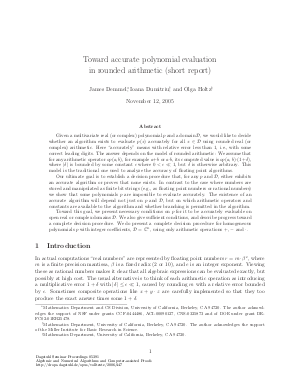Toward accurate polynomial evaluation in rounded arithmetic (short report)
Authors James Demmel, Ioana Dumitriu, Olga Holtz
-
Part of:
Volume:
Dagstuhl Seminar Proceedings, Volume 5391
Part of: Series: Dagstuhl Seminar Proceedings (DagSemProc) - License:
 Creative Commons Attribution 4.0 International license
Creative Commons Attribution 4.0 International license
- Publication Date: 2006-01-31
File

PDF
DagSemProc.05391.8.pdf
- Filesize: 238 kB
- 15 pages
Document Identifiers
Subject Classification
Keywords
- Accurate polynomial evaluation
- models or rounded arithmetic
Metrics
- Access Statistics
-
Total Accesses (updated on a weekly basis)
0Document
0Metadata
Abstract
Given a multivariate real (or complex) polynomial $p$ and a domain $cal D$,
we would like to decide whether an algorithm exists to evaluate $p(x)$ accurately
for all $x in {cal D}$ using rounded real (or complex) arithmetic.
Here ``accurately'' means with relative error less than 1, i.e., with some correct
leading digits. The answer depends on the model of rounded arithmetic:
We assume that for any arithmetic operator $op(a,b)$, for example $a+b$ or
$a cdot b$, its computed value is $op(a,b) cdot (1 + delta)$,
where $| delta |$ is bounded by some constant $epsilon$ where $0 < epsilon ll 1$,
but $delta$ is otherwise arbitrary. This model is the traditional one used to analyze
the accuracy of floating point algorithms.
Our ultimate goal is to establish a decision procedure that, for any $p$ and $cal D$,
either exhibits an accurate algorithm or proves that none exists. In contrast to the
case where numbers are stored and manipulated as finite bit strings (e.g., as floating
point numbers or rational numbers) we show that some polynomials $p$ are impossible to
evaluate accurately. The existence of an accurate algorithm will depend not just
on $p$ and $cal D$, but on which arithmetic operators and constants are available
to the algorithm and whether branching is permitted in the algorithm.
Toward this goal, we present necessary conditions on $p$ for it to be
accurately evaluable on open real or complex domains ${cal D}$.
We also give sufficient conditions, and describe progress toward
a complete decision procedure. We do present a complete
decision procedure for homogeneous polynomials $p$ with integer coefficients,
${cal D} = C^n$, using only arithmetic operations
$+$, $-$ and $cdot$.
Cite As Get BibTex
James Demmel, Ioana Dumitriu, and Olga Holtz. Toward accurate polynomial evaluation in rounded arithmetic (short report). In Algebraic and Numerical Algorithms and Computer-assisted Proofs. Dagstuhl Seminar Proceedings, Volume 5391, pp. 1-15, Schloss Dagstuhl – Leibniz-Zentrum für Informatik (2006)
https://doi.org/10.4230/DagSemProc.05391.8
BibTex
@InProceedings{demmel_et_al:DagSemProc.05391.8,
author = {Demmel, James and Dumitriu, Ioana and Holtz, Olga},
title = {{Toward accurate polynomial evaluation in rounded arithmetic (short report)}},
booktitle = {Algebraic and Numerical Algorithms and Computer-assisted Proofs},
pages = {1--15},
series = {Dagstuhl Seminar Proceedings (DagSemProc)},
ISSN = {1862-4405},
year = {2006},
volume = {5391},
editor = {Bruno Buchberger and Shin'ichi Oishi and Michael Plum and Sigfried M. Rump},
publisher = {Schloss Dagstuhl -- Leibniz-Zentrum f{\"u}r Informatik},
address = {Dagstuhl, Germany},
URL = {https://drops.dagstuhl.de/entities/document/10.4230/DagSemProc.05391.8},
URN = {urn:nbn:de:0030-drops-4477},
doi = {10.4230/DagSemProc.05391.8},
annote = {Keywords: Accurate polynomial evaluation, models or rounded arithmetic}
}
